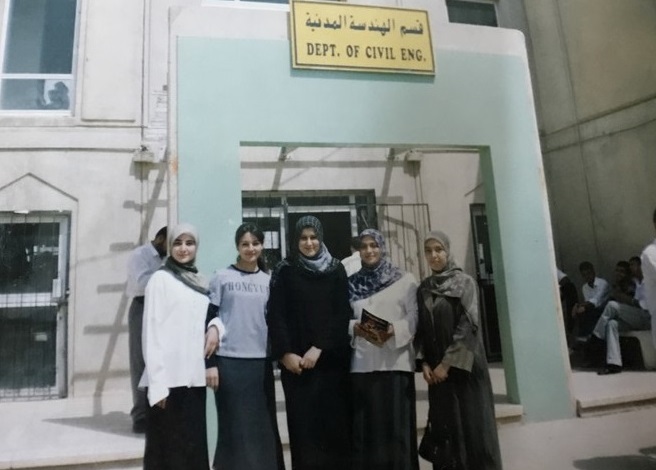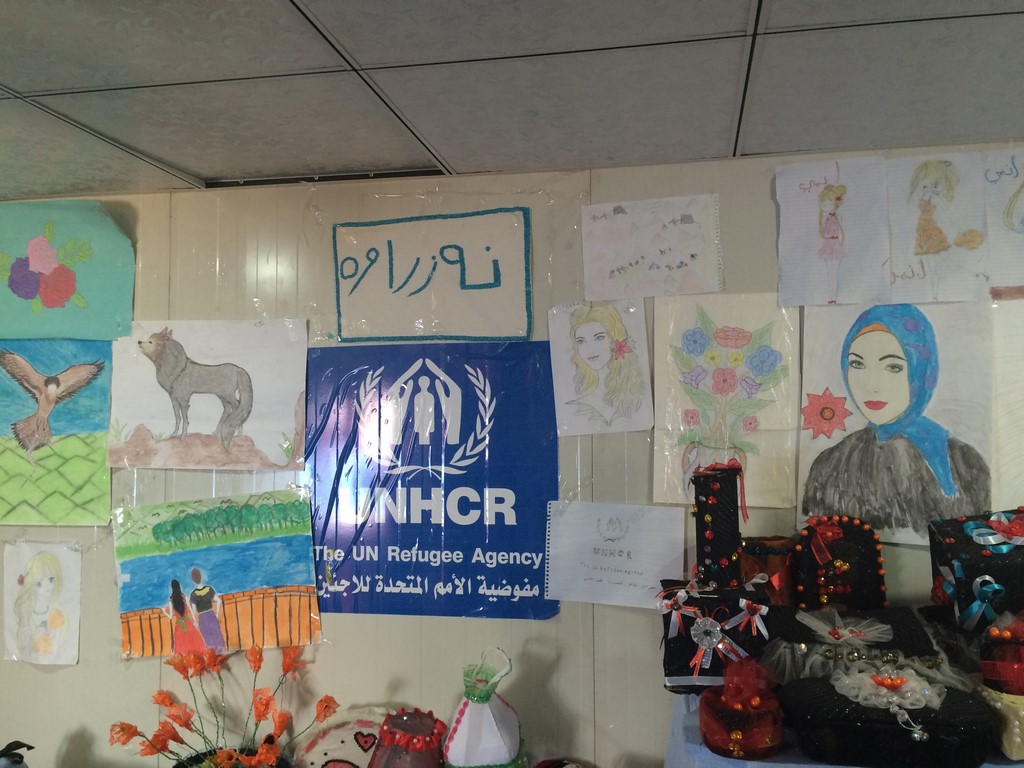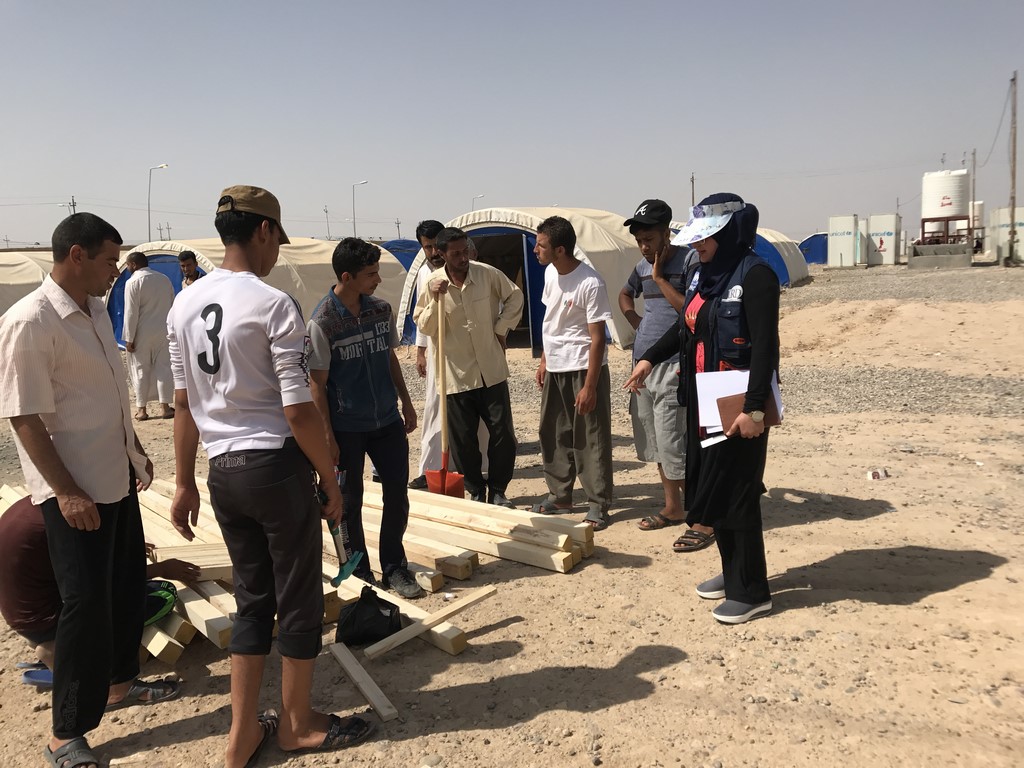Wars and conflict have divided families in Iraq and forced many to live far away from one another. Finding a safe place is often the utmost priority, no matter the separation it may cause. Recently, many families in Iraq have experienced this situation as a result of ISIL-inflicted crises. Remah, a 33-year-old mother of three, knows this pain of separation all too well.
Remah’s childhood was a peaceful and memorable one, and she lived in a stable area with her family of 11. She was an outstanding student and wanted to become journalist, but her father always encouraged her to become a doctor instead.
After the war of 2003 and the situations that followed, she could not achieve the high school marks which were required to study at medical college. Eventually, Remah was accepted at the Civil Engineer College of Tikrit University. This was a challenge for her, however, as the university campus was far away from her home and her family.

Remah during university time.
A new page in her life started when she met the love of her life, a man from Al-Sherqat city who became her husband. They got married and were living a happy life together. She became a mother when she gave birth to her first child in 2009, and again when they had their second child in 2010.
On June 10, 2014, ISIL took control of Tikrit, which very suddenly and drastically changed Remah’s life. Living under ISIL control was horrible; in addition to the destruction and corruption ISIL brought to the city, living in Tikrit became very difficult. Citizens felt insecure, and Remah and her family decided it was time to leave everything behind and flee to a safer place. After four months of strenuous daily living, the government released salaries for employees of the company where Remah’s husband worked, and the family received four salary payments they had been waiting for. This allowed them to flee to another place where they could live in peace.
Kirkuk was the family’s next destination. They left their house and everything behind carrying just one bag, and after trekking a fear-filled journey of 120 kilometers, they arrived in Kirkuk. They went to a house arranged for them by Remah’s friend, as finding housing was difficult at the time due to the increasing number of IDPs in Kirkuk.
A new page of life started for their family, carrying with it many challenges. It was difficult to adjust to their new life, and they had nothing to start with – just an empty rented house and a small amount of money which they had to spend very carefully. During this period, Remah and her husband were forced to overcome many difficulties, like convincing their children that their situation had changed, that life would not be like before and they would need to adjust to their new lifestyle.
After they were settled in Kirkuk, Remah started to apply for job opportunities with NGOs. She was accepted to work for Blumont at Nazrawa camp as a Community Mobilizer on a one-month contract. During that month, she showed her commitment and was determined and a problem solver. Because of this, she gained the trust of the people in the camp and her colleagues. She loved her work and she knew how to deal with IDPs, especially women, as she was one of them and has been through a good deal herself already.
Also worth mentioning, Remah is a talented handcrafter and painter, and her ideas were showcased in an exhibition of handicraft at Nazrawa camp. After her initial job contract was finished she renewed her contract with Blumont and said that, “New challenge has just begun, I have to be more creative and prove myself.’’

Handicraft exhibit in Nazrawa Camp.
After a while the situation in Kirkuk became unstable, as ISIL attacked the city and the level of danger and instability for IDPs changed. Remah and her husband decided to leave Kirkuk and move to Al-Sherqat, her husband’s city. Again, they left everything behind. But after moving to Al-Sharqat, things were not as they expected. ISIL attacked their new city as well, killing civilian families. After the ISIL attacks, Remah heard that Tikrit had been liberated so the family decided pack up once again and go back to their city regardless of the unstable living conditions and widespread destruction of homes. They stayed at the home of Remah’s brother, and despite all the situations they had gone through, she insisted that her children continue in their studies. After one month, they rented a house and started to arrange a normal life again.
Because of Remah’s good reputation and performance at Blumont, the Blumont staff in Kirkuk informed Remah of a new job opportunity in Salahaddin camp. She applied and was accepted as a camp technician. At the beginning, she faced many difficulties since the scope of work as a mechanic in Salahaddin camp was different from her role in the Kirkuk camp, but she persevered thanks to continuous support from her husband and guidance from colleagues and the Baghdad office.

Remah performing her duties as a camp technician.
After this long and strenuous journey, Remah was able to settle down in her own house and city, back on her feet and happy with her life and family.
At the end, Remah stated, “There is always hope whatever happens, and I always try to stay positive. Despite everything my family and I have gone through, I proved to myself and my family before anyone else that I can stay strong and balance between work and family no matter what life brings. I taught myself I face them, not to complain.
It was a very emotional and happy moment for me when my kids could attend school without making them to feel that they are displaced. In spite of all the obstacles on our way, we could always start a new life from zero more than one time. These experiences didn’t break me but they made me stronger. I always keep in my mind that I can succeed and give more no matter what happens. I think my family and I deserve the best, as we went through many dark days in our lives. I always believe future is hiding beautiful things for us.
I thank God for everything and my husband for his support; I also appreciate the support and guidance of my colleagues at Blumont. I would like to ask the international community to take an interest in the IDP problems and help them as much as they can. I am sure most of the IDPs are gifted people with great potential.’’



